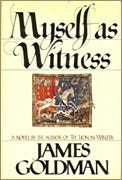Myself As Witness brings thirteenth-century chronicler Gerald of Wales out of retirement to record the last tumultuous years of King John’s reign. Witty and moving, this is a unique portrayal of the English monarch widely regarded as a monster, narrated by a man who loves him but has no illusions about his flaws.
A peremptory summons from King John in 1212 startles Gerald. Living in comfortable seclusion at Lincoln, he assumes that his long years of service with the devious, tempestuous Plantagenets are over. But John needs a chronicler, and frankly, Gerald is the only decent one still alive. “Great things are going to happen”, says the king, "I want a record kept”. Despite peevish protestations, Gerald is secretly delighted to be at the centre of action again. He’s known John for years and is undaunted by the king’s notorious temper. Forthright Gerald has never been afraid to speak his mind to royalty.
Momentous events do occur, but not the ones John hoped for: devastating defeats by the French, forced submission to the Pope, ongoing rebellion by his nobles and capitulation to their demands for a new Charter of Liberties. His formidable family haunt him. “I’m not Henry, Eleanor or Richard”, he cries in anguish, “I’m John!” Paranoia fed by misfortune and betrayal exacerbates his rage and despondency, leaving him unable to act decisively. He trusts nobody and pushes away those who love him: his queen, Isabelle; his loyal half-brother, William Longsword;* even the unimpeachable, elderly statesman William Marshal, who yet again proves to be England’s lynchpin. Desperation drives John inexorably toward self-destruction.
A thoughtful commentary on how perceptions of history are inevitably shaped by those who record it, Myself as Witness takes King John’s tragedy as its subject, but its narrator steals the show. Gerald is revealed in his own tart, engaging voice as a rather endearingly self-important man, sometimes testy but always likable, compassionate, and a friend to be relied upon right to the bitter end. (1979, 340 pages)
*Recent research has changed some preconceptions commonly believed when this book was written, in particular that Rosamund Clifford was William Longsword’s mother, now known to have been another of Henry II’s mistresses, Ida de Tosney.



